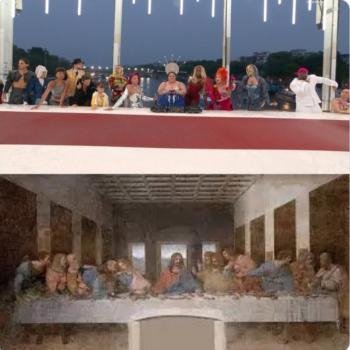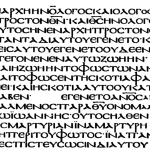In my previous article on justification, I shared the Catholic view as explained through the Council of Trent (1547). After analyzing justification, Trent moves on to the relationship between justification and sanctification, and the possibility of Christians losing their salvation. As with the other article, I quote Trent at length, provide hyperlinks to Scriptural support, and give a quick summary. Thank you.
Chapter 10: The Increase of the Justification Received
Having, therefore, been thus justified and made the friends and domestics of God, advancing from virtue to virtue, they are renewed, as the Apostle says, day by day, that is, mortifying the members of their flesh, and presenting them as instruments of justice unto sanctification, they, through the observance of the commandments of God and of the Church, faith cooperating with good works, increase in that justice received through the grace of Christ and are further justified, as it is written: He that is just, let him be justified still; and, Be not afraid to be justified even to death; and again, Do you see that by works a man is justified, and not by faith only? This increase of justice holy Church asks for when she prays: “Give unto us, O Lord, an increase of faith, hope and charity.”
Summary: Here, Trent confirms the consistent teaching of the Church that Christians receive justification, and that this justification is “justice unto sanctification…”. This means that we now belong to God and therefore must cooperate with God to increase this justice through grace, thereby increasing in further justification. Christians seek to increase justification by praying God grants them an increase in faith, hope, and charity (love). The Church see no difference between justification and sanctification, as they represent different, yet similar, aspects of the process by which God makes Christians holy.
Chapter 11: The Observance of the Commandments and the Necessity and Possibility Thereof
For they who are the sons of God love Christ, but they who love Him, keep His commandments, as He Himself testifies; which, indeed, with the divine help they can do. For though during this mortal life, men, however holy and just, fall at times into at least light and daily sins, which are also called venial, they do not on that account cease to be just, for that petition of the just, forgive us our trespasses, is both humble and true; for which reason the just ought to feel themselves the more obliged to walk in the way of justice, for being now freed from sin and made servants of God, they are able, living soberly, justly and godly, to proceed onward through Jesus Christ, by whom they have access unto this grace. For God does not forsake those who have been once justified by His grace, unless He be first forsaken by them. Wherefore, no one ought to flatter himself with faith alone, thinking that by faith alone he is made an heir and will obtain the inheritance, even though he suffer not with Christ, that he may be also glorified with him. For even Christ Himself, as the Apostle says, whereas he was the Son of God, he learned obedience by the things which he suffered, and being consummated, he became to all who obey him the cause of eternal salvation. For which reason the same Apostle admonishes those justified, saying: Know you not that they who run in the race, all run indeed, but one receives the prize? So run that you may obtain. I therefore so run, not as at an uncertainty; I so fight, not as one beating the air, but I chastise my body and bring it into subjection; lest perhaps when I have preached to others, I myself should become a castaway.
Summary: If Christians love God, they keep His commandments. Moreover, God never forsakes those unless they forsake Him. Christians must run the race. Christians must suffer with Christ to learn obedience. All this they accomplish through God’s grace. Furthermore, Christians must not fool or flatter themselves into thinking they possess their inheritance through faith alone if they fail to suffer with Christ.
Chapter 12: Rash Presumption of Predestination is to be Avoid
No one, moreover, so long as he lives this mortal life, ought in regard to the sacred mystery of divine predestination, so far presume as to state with absolute certainty that he is among the number of the predestined, as if it were true that the one justified either cannot sin anymore, or, if he does sin, that he ought to promise himself an assured repentance. For except by special revelation, it cannot be known whom God has chosen to Himself.
Chapter 13: The Gift of Perseverance
Similarly with regard to the gift of perseverance, of which it is written: He that shall persevere to the end, he shall be saved, which cannot be obtained from anyone except from Him who is able to make him stand who stands, that he may stand perseveringly, and to raise him who falls, let no one promise himself herein something as certain with an absolute certainty, though all ought to place and repose the firmest hope in God’s help. For God, unless men themselves fail in His grace, as he has begun a good work, so will he perfect it, working to will and to accomplish. Nevertheless, let those who think themselves to stand, take heed lest they fall, and with fear and trembling work out their salvation, in labors, in watchings, in almsdeeds, in prayer, in fastings and chastity. For knowing that they are born again unto the hope of glory, and not as yet unto glory, they ought to fear for the combat that yet remains with the flesh, with the world and with the devil, in which they cannot be victorious unless they be with the grace of God obedient to the Apostle who says: We are debtors, not to the flesh, to live according to the flesh; for if you live according to the flesh, you shall die, but if by the spirit you mortify the deeds of the flesh, you shall live.
Summary: I placed the two chapters above together because they reflect similar aspects of the possibility of assurance of salvation. On the one hand, there is the presumption that God predestined some for salvation. Trent contends that such a presumption is impossible, except via special revelation. On the other hand, Scripture does suggest that some may receive the gift of perseverance; however, this gift must not lead to the sin of presumption. Christians hope for the gift of perseverance; they do not take such a gift for granted. Christians strive for the prize; they do not live as if they have already won it.
Chapter 15: By Every Mortal Sin Grace is Lost, But Not Faith
Against the subtle wits of some also, who by pleasing speeches and good words seduce the hearts of the innocent, it must be maintained that the grace of justification once received is lost not only by infidelity, whereby also faith itself is lost, but also by every other mortal sin, though in this case faith is not lost; thus defending the teaching of the divine law which excludes from the kingdom of God not only unbelievers, but also the faithful who are fornicators, adulterers, effeminate, liars with mankind, thieves, covetous, drunkards, railers, extortioners, and all others who commit deadly sins, from which with the help of divine grace they can refrain, and on account of which they are cut off from the grace of Christ.
Summary: For the teaching on how a Christian is restored to grace, please read Chapter 14: The Fallen and Their Restoration. Trent correctly teaches that grace freely received from God may be freely lost through an act of mortal sin. Moreover, like St. Paul, Trent warns the faithful that certain sins exclude them from the kingdom of God. These sins stand so contrary to the divine law as to warrant spiritual death and the need for spiritual restoration. God, who freely loves, also freely wants love in return. If Christians freely reject God, even after His gift of initial justification, God honors their free choice. Justification does not destroy free will.
Chapter 16: The Fruits of Justification, that is, the Merit of Good Works, and the Nature of that Merit (Quoted in part below)
Therefore, to men justified in this manner, whether they have preserved uninterruptedly the grace received or recovered it when lost, are to be pointed out the words of the Apostle: Abound in every good work, knowing that your labor is not in vain in the Lord. For God is not unjust, that he should forget your work, and the love which you have shown in his name; and, Do not lose your confidence, which hath a great reward. Hence, to those who work well unto the end and trust in God, eternal life is to be offered, both as a grace mercifully promised to the sons of God through Christ Jesus, and as a reward promised by God himself, to be faithfully given to their good works and merits.
Thus, neither is our own justice established as our own from ourselves, nor is the justice of God ignored or repudiated, for that justice which is called ours, because we are justified by its inherence in us, that same is the justice of God, because it is infused into us by God through the merit of Christ. Nor must this be omitted, that although in the sacred writings so much is attributed to good works, that even he that shall give a drink of cold water to one of his least ones, Christ promises, shall not lose his reward; and the Apostle testifies that, That which is at present momentary and light of our tribulation, worketh for us above measure exceedingly an eternal weight of glory; nevertheless, far be it that a Christian should either trust or glory in himself and not in the Lord, whose bounty toward all men is so great that He wishes the things that are His gifts to be their merits.
Summary: Please read the full chapter in the link above. Here, the key word used by Trent is infused justice, or infused righteousness. The Catechism states:
1999 The grace of Christ is the gratuitous gift that God makes to us of his own life, infused by the Holy Spirit into our soul to heal it of sin and to sanctify it. It is the sanctifying or deifying grace received in Baptism. It is in us the source of the work of sanctification
The Catechism then quotes 2 Corinthians 5:17-18
Therefore, if anyone is in Christ, he is a new creation; the old has passed away, behold, the new has come. All this is from God, who through Christ reconciled us to himself.
By grace, God makes those baptized into Christ truly holy; He does not merely declare them holy, as Protestant’s teach. This holiness gets infused into the Christian’s soul to enable them to further grow in holiness. Moreover, this infusion of holiness does not then destroy the Christian’s free will. The Christian must cooperate with God to work out their salvation. God in turn rewards our merits with glory in heaven.
In short, God saves us by His grace, enables us to grow in holiness by an infusion of holiness, and allows Christians to merit rewards in heaven, as He crowns His own gifts. God does so freely, so in no way do we lose our ability to follow or walk away.
Final Thoughts…
In this article, I examined the Council of Trent’s view on justification, sanctification, and the possible loss of salvation. According to Trent, by grace God infuses justice (righteousness/holiness) into willing souls. This enables the free cooperation of the justified to in the working out of their own salvation. Trent affirms the consistent teaching of the Church that justification, freely received, may also be freely returned, as justification (righteousness/holiness) in no way eliminates free will. St. Paul even warns the Christians in Corinth of the dangers of mortal sin.
Furthermore, God intended for His creation to share freely in His “blessed life.” The first paragraph in the Catechism beautifully states:
1 God, infinitely perfect and blessed in himself, in a plan of sheer goodness freely created man to make him share in his own blessed life. For this reason, at every time and in every place, God draws close to man. He calls man to seek him, to know him, to love him with all his strength. He calls together all men, scattered and divided by sin, into the unity of his family, the Church. To accomplish this, when the fullness of time had come, God sent his Son as Redeemer and Savior. In his Son and through him, he invites men to become, in the Holy Spirit, his adopted children and thus heirs of his blessed life.
God calls all to Himself, He does not force anyone. Therefore, for those who choose to reject God’s gift, He honors that choice even if this means separation from Him forever.
Thank you!
Read The Latin Right’s other writing here.
Please visit my Facebook page and IM your questions (and follow my page) or topics for articles you would like covered.
Also, please subscribe my YouTube page for updates on upcoming articles.

















